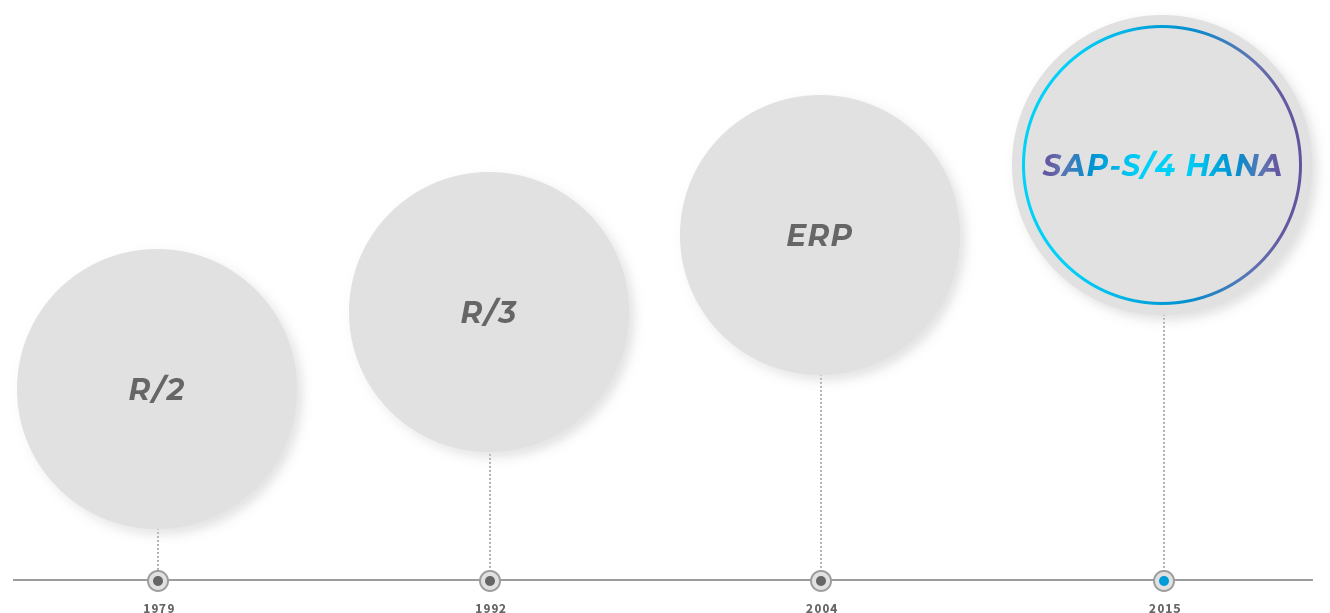SAP S/4 Hana
- TOP
- Core Business
- SAP-S/4 HANA
What is ERP?
Enterprise Resource Planning is a term originally used to describe concepts and methods for management reform. This is one of management approaches for efficiency and reforms by comprehensively controlling all management resources owned by the company for optimal allocation and distribution.
The ERP package refers to the information system to realize this approach.
Enterprise Resource Planning(ERP)is a methodology that enables businesses to reform or improve all internal operations (such as sales, logistics, inventory, financial management and accounting) from the perspective of management resources such as human, material, capital, information, and time. It is not a substitute for business operations through conventional computer systems but is a means of achieving business improvement.
Why ERP?
Why is it supported?Four important points
to answer this.
-
Accelerate management decision-making
In today's tough economic environment, with globalization and high value-added processes being sought after, simply making business decisions based on economic conditions won't lead to growth. The key to corporate growth lies in producing new value faster than competitors. This is why ERP is being recognized as an important management tool due to its ability to:
- 1.
Provide necessary information for prompt and accurate management decisions.
- 2.
Offer precise and timely information.
- 3.
Allow access to the necessary information at any time.
- 1.
-
Responding to the demand for globalization
With the globalization of business activities and the increasing complexity of business structures, it has become increasingly important to enhance information management at major production and sales bases, highlighting the need for high global compatibility capabilities, such as multilingual and multicurrency support in ERP systems. Furthermore, the fundamental principles of ERP, such as the optimization of business processes and standardization, can enhance the reliability of core system deployment across business locations and strengthen a company's competitiveness.
-
Responding to internal control requirements
In recent times, there has been a growing awareness of compliance and risk management, and companies are strengthening their internal controls. The concept of business process definition and integrated databases provided by ERP is believed to have a significant impact on control requirements in the areas of internal and IT control.
-
Preparing for changing rules and external factors
When there is a change in regulations within the business area, such as tax system changes or accounting standard revisions, it is always necessary to ensure compliance with the changes in the core system. ERP packages that are updated regularly for localization compliance are believed to contribute to reducing operational risks in system management by responding to system needs commonly.
What is SAP?
SAP is one of the world’s leading producers of software for the management of business processes, developing solutions that facilitate effective data processing and information flow across organizations.
Founded in 1972, the company was originally called "System Analysis Program Development (Systemanalyse und Programmentwicklung)", later shortened to SAP.
SAP is both a company name and synonymous with ERP software, one of which is SAP S/4HANA.
S/4HANA
-
The world's only the ERP integration database with multi-company, multilingual, multi-localization capabilities.
S/4HANA is the only ERP software that truly supports multi-company, multi-language, and multi-currency operations, enabling group companies worldwide to execute daily tasks on the same system in multiple languages.
The table structure of master and transactional data always includes the organizational code as a key field, designed to enable multiple organizations to operate simultaneously. The key field for text fields in various masters is always the language key.
Local rules such as tax regulations updated daily worldwide are supported by SAP's various locations. The software is designed with an OS and DB layer that can support 24/7 availability.
In addition, daily transactional data in all business areas is guaranteed to be updated in real-time on a single DB.
-
World’s strongest reliability
Is that core system truly reliable software for your company?For over 50 years, SAP has been developing ERP package software, and SAP S/4HANA is the latest version that brings together the company's achievements.
As an enterprise software company, the company is one of the world's largest, with one of the largest scales as an ERP-centric business, serving some of the world's largest corporations.
Therefore it is certain that SAP's ERP package will continue to be used worldwide in the future.
On the other hand, the discontinuation of support or development for package software is the biggest risk for a core system.
-
Proven standard functionalities with a wealth of implementation cases and development history.
Success in package implementation relies on maximizing the use of standard functions while minimizing custom development. SAP S/4HANA, developed based on extensive history and successful implementations, reduces this risk. In other words, implementing SAP S/4HANA can mitigate all risks.
However, if the package itself is poorly functioning, the project would be far from success in the end.
With its impressive history, case studies and track record of successful implementations, S/4HANA can help mitigate all types of risks.

The SAP solution allows you to set up multiple accounting ledgers keyed by "company code" on a single system. This enables you to generate financial tables and other accounting reports for each ledger. In addition to P/L statements by affiliate, you can manage profits and losses by business, division, and product. With this solution, we can provide you with a clear visualization of your company's current situation early on. This can help you make informed management decisions.